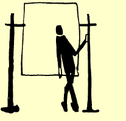"There's a trend in our culture to be constantly up to date because we're connected through the internet, and an art form that would be entirely backward-looking and museum-like would make no sense. People are interested in what's happening right now." - Esa-Pekka Salonen
"Esa-Pekka Salonen has progressed through a number of stylistic phases during his career as a composer. In the late 1970s when he was studying with Rautavaara at the Sibelius Academy, he wrote in a lyrical, neo-Romantic style; a few years later, after studying in Italy with Donatoni and Castiglioni, he adopted strict serial principles, notably in his Yta series of solo pieces. For a number of years after his conducting career took off in 1983, he had little time for composition, but began to write once again in the mid-1990s, mostly in larger forms, with a new sense of energy, joie de vivre and orchestral brilliance." (Full bio here).
This playlist was made after I heard the new recording of Salonen's Grawemeyer winning Violin Concerto. The irresistible rhythmic energy and spastic melodies make his music highly accessible and intriguing, and reminds me of Stravinsky. As a successful conductor, Salonen surely has a broad palette of orchestral colors, but there's hardly any moment in his music that is avant-garde for avant-garde's sake. I highly recommend the Violin Concerto, Foreign Bodies, Helix, and Gambit to any music fan.
Get this collection in one Spotify playlist: Esa-pekka Salonen as Composer (61 tracks from 24 albums, total time: 7 hours). Ctrl (CMD) + G to browse in album view. More links: composition list with composer's notes; interviews with Alex Ross and David Patrick Stearns.
P.S. The Violin Concerto is available on Spotify UK but won't be available in the US till October 16th (unless it appears earlier than the CD release). I have no idea why major classical labels still use different release dates for digital releases in different regions.





Very interesting composer. Thanks for introducing me to him!
ReplyDeleteNice to find this news. Thank you for sharing!
ReplyDeleteinstagram search
kobe byrant shoes
ReplyDeleteyeezy boost 350 v2
fila
louboutin shoes
golden goose outlet
kyrie 4 shoes
100% real jordans for cheap
birkin bag
lebron 16
michael kors outlet
I am interested in listening to his playlist. pool enclosures Kissimmee FL
ReplyDelete